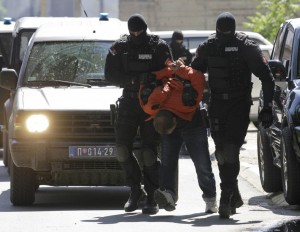 BELGRADE (Reuters) -Dacic, who leads the Socialist Party of late Serb strongman Slobodan Milosevic, announced the arrests at a news conference in the southern town of Vranje, two days before presidential and parliamentary elections.
BELGRADE (Reuters) -Dacic, who leads the Socialist Party of late Serb strongman Slobodan Milosevic, announced the arrests at a news conference in the southern town of Vranje, two days before presidential and parliamentary elections.
Five ethnic Albanians were arrested on suspicion of war crimes in dawn raids on Friday, Serbia’s Interior Minister Ivica Dacic said, two days before he runs for president and leads his Socialist party in knife-edge parliamentary elections.
The allegations stem from a low-level ethnic Albanian insurgency in 2000-2001 in a region of southern Serbia bordering Macedonia and the country’s former Kosovo.
Dacic, who leads the Socialist Party of late Serb strongman Slobodan Milosevic, announced the arrests at a news conference in the southern town of Vranje, two days before presidential and parliamentary elections.
“These arrests are not about political persecution,” Dacic said. “They are all equal before the law.”
He said the five were suspected of abducting and killing two Serbs during the fighting in 2001. Three others were arrested for illegal weapons possession and resisting police orders.
European rights and security body the Organisation for Security and Cooperation in Europe (OSCE) said a local OSCE employee, hired in 2001 in consultation with the Serbian authorities, was among the eight arrested.
“We take the matter seriously and are committed to working in close cooperation with the Serbian authorities on this issue,” mission head Ambassador Dimitrios Kypreos said in a statement.
Both Dacic and his party are polling third in Sunday’s elections.
Whoever wins – the co-ruling Democratic Party or the right-wing popu
list opposition – will likely have to court Dacic’s Socialists in order to form a coalition government.
Police have carried out a number of arrests of ethnic Albanians from Kosovo in recent weeks, after Dacic promised “reciprocity” for the arrest of Serbs in Kosovo trying to organise voting for the Serb minority in Sunday’s polls.
The conflict in southern Serbia ended with a NATO-brokered deal to disarm the rebels and improve integration. The region remains one of Serbia’s poorest, but has been largely quiet since 2001.












